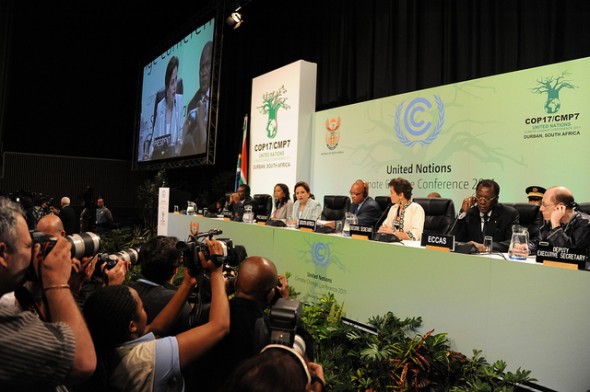Dear Friends,
I am writing on the eve of traveling to the United Nations negotiations in Durban, South Africa.
Why I’m Going
Like everywhere on the planet, here in upstate New York we’re feeling the impacts of our changing climate. While the South faces record droughts and West faces record wildfires, this year we faced unseasonably high temperatures, a tornado, and the second 100-year flood in 5 years. Binghamton and Owego are recovering after heavy rains led the Susquehanna to overflow its banks, causing millions of dollars in damage to historic downtowns.
On top of this, we face another gathering storm. Despite significant opposition, New York’s Governor Cuomo is poised to allow hydrofracking to drill for gas beneath our state using millions of gallons of water and toxic chemicals. To add to evidence that fracking damages our health, environment and local economy, research is mounting that the practice is contributing to global climate change. I’m headed to the Durban negotiations to raise awareness on the links between hydrofracking and climate change.
Fracking with Our Future
Although promoted as “natural” and “clean,” the gas we burn for energy turns out to be dirtier than we thought. Buried in underground deposits formed millions of years ago, this gas is mostly methane, a climate-killing gas that’s 100 times more powerful than carbon dioxide in trapping heat when released into the atmosphere. New EPA studies show that drilling, piping, and burning fossil gas now accounts for a whopping 17% of all planet-heating pollution in the U.S.
Fracking is even worse for our climate than conventional gas drilling. Research by Cornell’s Professor Robert Howarth is finding that, due to methane released and energy-intensive drilling practices, greenhouse gas pollution from “fracked” gas is dirtier than even coal.
Our county planning department estimates that one (that’s right, one) fracking well pad* would release more heating-trapping pollution than our entire 100,000-person county would in one year! Fracking would completely overwhelm the hard work of our governments and institutions to lessen our impact on the global climate.
Conclusion: along with its other serious impacts, fracking worsens our already changing climate. Yet President Obama, gas industry reps, and even major environmental groups are still calling gas a “clean transition fuel.”
The Fight is On
What does all this mean? Fracking will be the next front in the fight to keep a livable future for all. We know we need to transition away from dirty fossil fuels and towards a genuine clean economy that creates good, local jobs in industries like energy efficiency and solar, geothermal, and wind power.
But the gas industry is fighting hard; it’s spending tens of millions on a media campaign to convince Americans that fracking forgas is “safe” and “clean.” (Have you seen the ads?)
As Bill McKibben said last year at the U.N. climate negotiations in Mexico, “what the climate fight comes down to is everyday people (our heroes) organizing themselves against powerful corporate barons who want to keep a good thing going for themselvesfor a few more years.”
Yet, I am hopeful. We have seen how people-power can trump corporate power; including the recent White House protests that prompted President Obama to put the dirty Tar Sands oil pipeline on hold.
People Power
One of these everyday heroes is Aaron Snow. A tall and outgoing 27-year old, Aaron is a seventh-generation farmer whose family has been farming in Caroline since 1816. Passionate about local agriculture, Aaron returned from the Peace Corps in Tanzania to start Tompkins County’s first creamery in half a century.
Last year, when Aaron learned that hydrofracking threatened his farm, he went door-to-door to organize his neighbors to protect our land, air, and water from fracking. Inspired, he chose to run for Town Council on a platform of protecting Caroline and banning hydrofracking.
Last month, in a stunning election, Caroline voters elected Aaron and other pro-ban candidates by historic 2-to-1 margins. It’s a clear message: no to dirty energy extraction and yes to building a clean economy that creates lasting prosperity for all. Similar elections happened in several nearby towns, including Dryden, which was sued by the gas industry for banning fracking.
These are just a few of the people-powered movements emerging across New York and the nation that give me hope. While at the U.N. climate talks next week, I’ll be sharing these stories with government delegates and grassroots organizers, and will work to bring the message about hydrofracking to the climate negotiations.
Dominic Frongillo
*Note: the original version of this dispatch contained an error in which the word “pad” was omitted from this sentence. Total greenhouse gas emissions from one 8-well pad over the life of the wells were calculated to be equivalent to one year’s worth of community emissions from Tompkins County.

